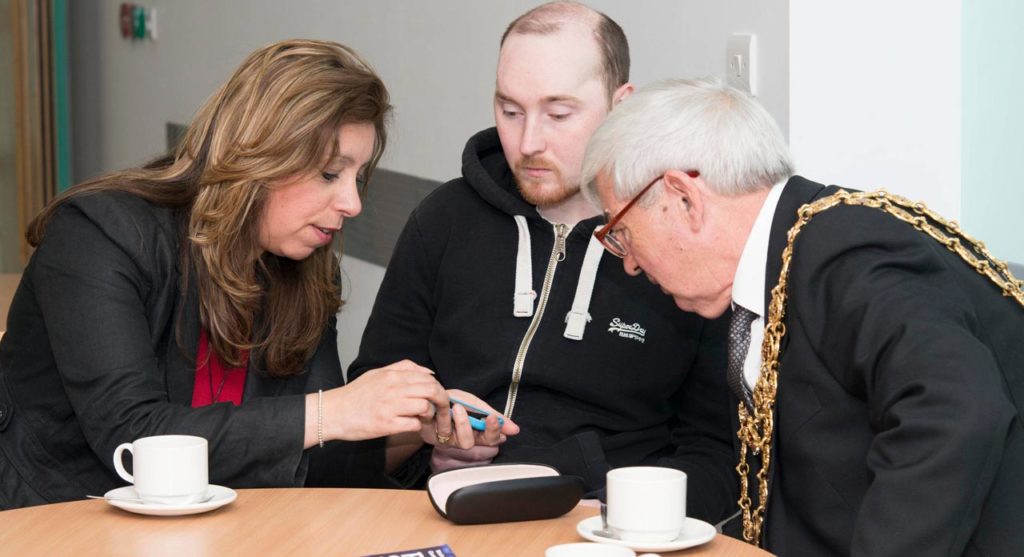
Luke Flavell (centre) with Jo Plumb (left), QEHB Head of Research and Development Operations, and Lord Mayor of Birmingham, Councillor Ray Hassall.

Luke Flavell (centre) with Jo Plumb (left), QEHB Head of Research and Development Operations, and Lord Mayor of Birmingham, Councillor Ray Hassall.

Luke Flavell (centre) with Jo Plumb (left), QEHB Head of Research and Development Operations, and Lord Mayor of Birmingham, Councillor Ray Hassall.
On the morning of July 11, 2012, he was driving to work in his pride and joy, a turbocharged Toyota MR2 sports car that he had owned for just ten weeks after borrowing the money from his grandfather to buy it.
It was raining, the roads were wet and Luke, who was 22 at the time, lost control of the powerful two-seater while overtaking.
The car smashed into a lamp-post leaving Luke, of Lower Gornal, Dudley, fighting for his life with multiple brain injuries, a broken back and two punctured lungs. He also lost the sight in his right eye.
“I overtook a car in the rain and just lost the rear end,” he remembers. “I wasn’t speeding but it was a combination of the wet road, the fact that the car was rear-wheel drive and the lamp-post being there.”
Luke was air-lifted to the critical care unit at Queen Elizabeth Hospital Birmingham (QEHB) where, just days later, his family were told he would probably not survive.
On the 15-point Glasgow Coma Scale (GCS), used to project the potential outcomes for brain injury patients, Luke’s score was just four, suggesting that if he did live he would be severely disabled.
Three years and three brain operations later, though, Luke, now 25, is walking and talking and determined to get his life back.
“All of the doctors and nurses have been amazed by his recovery,” said mum Jackie. “Many of them have told us that they had never seen anyone recover after having such a low GCS score.”
Luke’s recovery has been far from straightforward, though. He suffered pituitary failure and also contracted a rare strain of c-diff, pneumonia and various other complications before finally going home in March 2013.
Eager to give something back after his treatment Luke and Jackie are now enthusiastic supporters of trauma research and jumped at the chance to become members of the QEHB-based National Institute for Health Research Surgical Reconstruction and Microbiology Research Centre’s (NIHR SRMRC) patient and public involvement (PPI) group.
“Being part of the PPI group has actually helped me understand more about what went on during my recovery – it has filled in some of the gaps,” said Luke.
“It’s interesting to see what research is going on into all of these areas that had an impact on my treatment.
“I have been there and done that and if anything I can do or say helps somebody else going through the same thing then it is worth doing.
Jackie added: “Being part of the PPI group gives Luke a purpose and makes him feel worth something, and that is important to him.
“How do you say ‘thank you’ for someone saving your son’s life? Anything we can do that will benefit anybody in the future, we are happy to do it.”
Luke still has regular neuro-physiotherapy at home, goes to the gym twice a week and enjoys other activities with the Langstone Society in Dudley and is hoping to return to college in the future.
“I’m still the same person,” he said. “I was a pain in the neck before my accident and I still will be at the end of this, but I will keep going and I am determined to get there.
“I still love cars, being able to drive again is a big goal for me, and I would love to get a job.
“Trying to keep up with the normal pace of life is difficult with a brain injury but I’m determined to get back to as normal a life as I can. I’m not the sort to give up.”